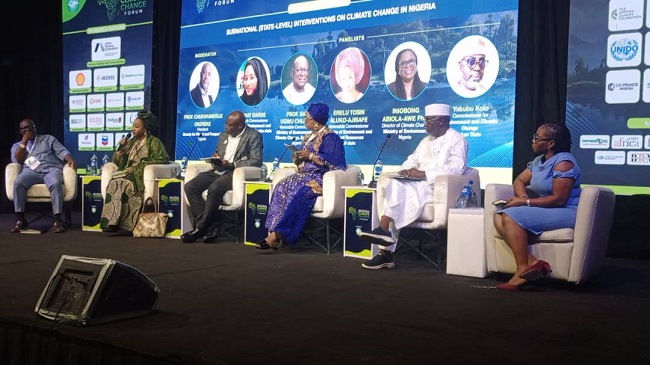Four state Commissioners of Environment from the South-West, South-East and North Central geo-political zones of Nigeria have highlighted the need for political will and increased funding for climate action at the subnational level.

The commissioners spoke as panelists during the high-level panel session on subnational climate action hosted by the Society for Planet and Prosperity (SPP) in partnership with the African Climate Foundation (ACF) at the just concluded Nigeria Climate Change Forum which held in Abuja on Wednesday, January 29, 2025.
The panel session, which was moderated by Professor Chukwumerije Okereke, President, SPP, featured Commissioners of Environment and Climate Change from Enugu, Professor Sam Ugwu; Commissioner for Environment and Natural Resources, Ekiti State, Chief Mrs. Tosin Aluko; Commissioner for Environment, Niger State, Yakubu Kolo; Commissioner for Environment and Climate, Taraba State, Aishat Bard, alongside a representative from the Department of Climate Change, Federal Ministry of Environment, Mrs. Eddidiong Eyo.
The panel session was organised to enable the commissioners to showcase their states’ climate actions, share best practices, and discuss some of the challenges they face in implementing climate change initiatives.
In his response to the question on the status of state-level climate efforts, Professor Sam Ugwu listed the key actions taken by the Enugu State Government to include: the establishment of a stand-alone Ministry of Environment and Climate Change to strategically drive sustainable impact; the development of a pioneering climate change policy and action plan that was recently approved by the executive governor of Enugu State; and the appointment of Professor Chukwumerije Okereke, a globally renowned scholar on climate governance, as a Senior Special Adviser to the governor on climate change policy and sustainable development.
Aishat Barde, Commissioner for Environment and Climate Change for Taraba State, said the achievements of Taraba state include restructuring the former Ministry of Environment to incorporate climate change; developing a climate change policy and action plan which was recently validated by stakeholders; and banning of illegal mining to protect the environment and public health.
She further stated that Taraba State has allocated 5% of its 2025 budget to the Ministry of Environment and Climate Change; launched a tree-planting initiative targeting two million trees, and advanced climate awareness through the “Greening Taraba Initiative.”
“However, we are grappling with challenges such as deforestation and desert encroachment,” she stated.
Erelu Aluko-Ajisafe, Commissioner for Environment and Natural Resources, Ekiti State, described the state as a pacesetter in climate initiatives as evidenced in the state’s performance in the recent Subnational Governance Performance report produced by SPP in collaboration with the Federal Ministry of Environment, adding that the state is currently collaborating with local and international NGOs on several key climate change initiatives.
Yakubu Kolo, Commissioner for Environment, Niger State, highlighted the state government’s efforts to adapt to the impacts of climate change, describing Niger State as an agricultural hub, and emphasising that climate change poses a significant threat to this vital sector.
To address this challenge, he noted that the government has developed a policy blueprint during the Niger State Green Economy Summit to serve as a strategic guide for the state’s adaptation measures and created an agency on the green economy that is fully supported by the state governor.
Mrs. Edidiong Udo, Principal Scientific Officer, representing Dr. Iniobong Abiola-Awe, Director, Department of Climate Change (DCC) at the Federal Ministry of Environment, shared some ongoing efforts at the national level to support state governments in strengthening their climate governance and policy.
All the commissioners identified inadequate climate finance, lack of public and awareness of climate change, and limited political buy-in from elected officials as some of the significant barriers to climate action at the subnational level.
Mrs Udo also advocated for a peer-to-peer knowledge-sharing system to enable states to learn from one another through best practices in addressing climate challenges.
The Nigeria Climate Forum, hosted by the Federal Ministry of Innovation, Science and Technology, brought together several key stakeholders cutting across government, private sector, advocacy groups, civil society organisations, as well as local and international NGOs, to discuss innovative ideas to catalyse transformative climate action across Nigeria and Africa.
By Ugochukwu Uzuegbu, Communication Specialist, SPP
